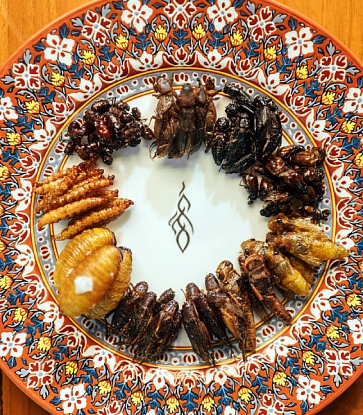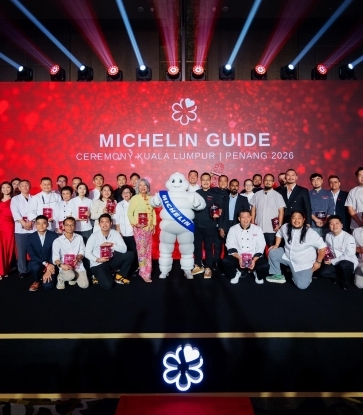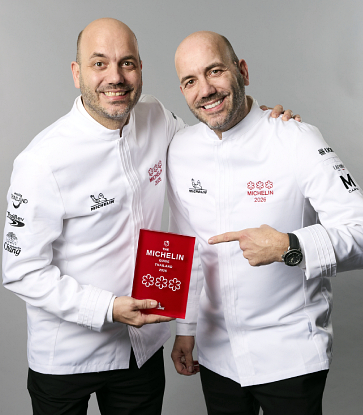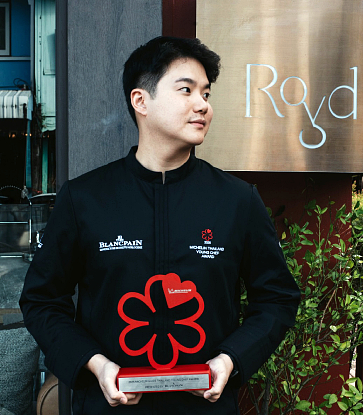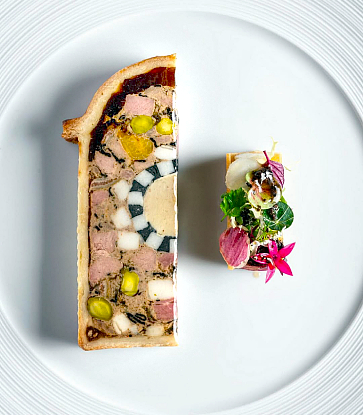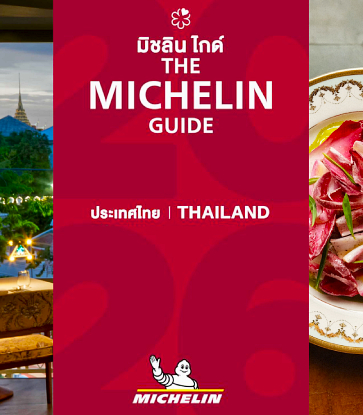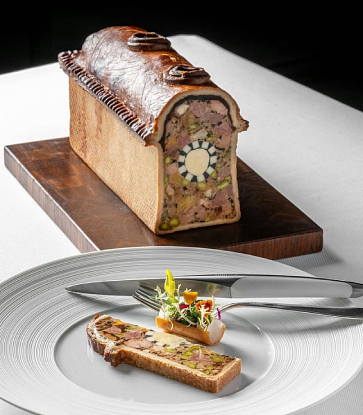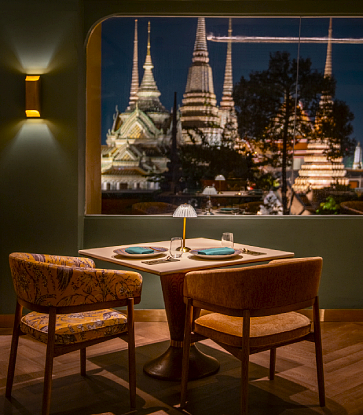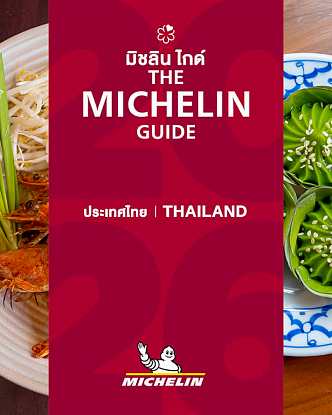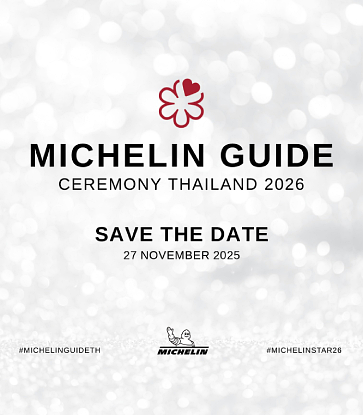Food is not just something that fills our stomachs, helping us live day to day. It also nourishes our lives, becoming part of our collective memory as we feast on the past into the present, creating and defining our future. It then follows that every chef has their own origins, shaping their paths and philosophies into their own unique styles and approaches. The same can be said about restaurants too. So, what interesting insights can chefs and owners of MICHELIN-listed restaurants share about the past, present, and future of cuisine?

Tim Butler, Head Chef and Part Owner, Eat Me
MICHELIN Plate, MICHELIN Guide Thailand 2021
• International Cuisine
“My food is and has been constantly evolving to the needs of our customers. To focus on reaching our goals, we need to be versatile in the way that we think about ourselves, our restaurants, and the industry as a whole and be able to adapt faster than ever. Highlighting local products is an obvious trend that has been going on for quite sometime now. And COVID-19 has definitely put it on a fast track with sustainable fish, secondary cuts, carefully raised meats, and so on. We have moved away from being heavily dependent on imported products over the last few years, so this is not a huge shift for us.
“The next year or so is going to be very rough for the upper echelons of fine dining, especially with the lack of international travel. Rethinking local markets is going to be key to survival. That being said, there will always be a place for multi-course drawn-out dinners. My guess is you will see these being done on a much smaller scale, with smaller restaurants and lower overheads. Or transitioning restaurants along the lines of Bo.lan and Err where the focus has shifted from large volume fine dining to casual dining, but still being able to offer the full fine-dining experience in a smaller part of the restaurant.”

Chef Phanuphon "Black" Bulsuwan, Chef and Owner, Blackitch Artisan Kitchen
MICHELIN Plate, MICHELIN Guide Thailand 2021
• Japanese Contemporary Cuisine
“Blackitch Artisan Kitchen emphasises many different facets, from culinary craftsmanship to fermentation to ingredient preparation. We endeavour to maximise it all, all the way to food waste management, drawing on knowledge from all over the world. Most importantly, we focus on using local Thai seasonal ingredients. We are all about sustainability.
“I believe for us to thrive in the future, we must adapt and progress, while still being firmly rooted in being Thai. Going forward, we must integrate and advance cooking further. We cannot stop. For example, we still have so much more to learn about Thai ingredients and Thai wisdom. And then there is knowledge from the rest of the world for us to discover. We learn, integrate, and develop as we head into the future. This may be why COVID-19 did not impact us as much as other restaurants, because we are always moving forward. So, our customers are never bored. They always come back for a new experience every time.”

Chef Supinya “Jay Fai” Junsuta, Chef and Owner, Jay Fai
One MICHELIN Star, MICHELIN Guide Thailand 2021
• Thai Cuisine
“What makes my shop distinctive is in how I like to follow my own lead. I make food instinctively. I don’t stick to one theory or philosophy. A dish may have been made a certain way in the past, but then I’ll put my own spin on it, improving it, not just in using better ingredients, but also in presenting it. And that is not enough. It must also taste great too, and then it’s perfect.
“I’m getting on in years, so I think the future of our restaurant is in the next generation’s hands. They might get my treasure, and I do want to know about any changes. But this is their right and their future, and I believe they can handle it. This next generation is talented. I can see the future in them, and it is good. They will accomplish so much more because we will always need to be making food -- good food.”

Thanaruek Laoraowirodge, Owner, Somtum Der (Si Lom)
MICHELIN Plate, MICHELIN Guide Thailand 2021
• Northeastern Thai Cuisine
“As Chef Kornthanut ‘Korn’ Thongnum is from Sakol Nakorn and I am from Khon Kaen, the food at Somtum Der is Northeastern Thai food. We emphasise cleanliness and hygiene so that no matter where Somtum Der opens a branch, here or abroad, people will accept us. I believe this is why we are still here, even after 11 years. It allows us to fulfill our goal for our food to be local Thai, global favourites, or local Thai food that is loved all over the world.
“Currently, Somtum Der has branches in six cities in different countries that have been very well accepted. COVID-19 changed a lot. It made us go back and think about what to do to stay in business. Other than being a dine-in restaurant only, we knew we had to expand our business, especially in big cities or in countries where we already have a presence and in other provinces in Thailand. But we couldn’t wait for people to come to our restaurants to eat. So we decided to develop products under the Somtum Der brand to sell at our overseas stores as well as export. It could be som tam sauce or other products. We wanted to expand to becoming a food and beverage provider, developing that business line into the future.”

Muay “Jay Oh” Sae Chua and Sirichai Taweepoonasap, Owners, Jay Oh
Bib Gourmand, MICHELIN Guide Thailand 2021
• Thai Cuisine
“Our restaurant’s concept is ‘delicious food from the best ingredients for an affordable price’. We have a foundation from an old-school rice porridge shop, Akong style. We serve food that is easy to eat and people know, like jubchay (Thai vegetable stew), crispy pork, and more. We keep up with the times, adjusting our menu based on what’s popular. Currently, our menu features Thai and Chinese dishes, with trendy items like spicy salmon salad and hot pots that would never have been offered before.
“As for the future, our restaurant will still be a family business. There are no plans for opening up branches or selling franchises. But we will continue to change our menu, responding to the changing tastes and preferences of our customers. For this new generation, to expand our customer base and offer additional conveniences, we offer delivery services through various apps as well as hiring our own staff to handle this.”

Chef Henk Savelberg, Chef and Owner, Savelberg
One MICHELIN Star, MICHELIN Guide Thailand 2021
• Contemporary French Cuisine
“Cooking is my passion. My culinary philosophy is for me to find the best quality ingredients to cook good, tasty French food. When people enjoy my food, it makes me happy. For me, French cuisine is all about tradition and gastronomy. French cuisine is, personally, the best cuisine. France has the best products with a lot of variety and a wide choice of seasonal ingredients. Throughout my career as a chef, I have always been exploring new cooking techniques, but I always aim to create traditional flavours using the best ingredients. I believe in good quality ingredients, good flavours, and good wines to create good memories.”

Chanchawee “Aunt Dang” Sakunkan, Founder, Krua Apsorn
Bib Gourmand, MICHELIN Guide Thailand 2021
• Thai Cuisine
“Krua Apsorn focuses on high quality ingredients. We want to serve our diners exceptional food. For example, we offer yellow curry with lotus stems, using only the tenderest lotus stems, which are difficult to find in the markets. Even if the ingredients we want cost a bit more, we get them because our customers will dine on deliciousness. For our yellow curry stir fry, we were the first restaurant to use whole, luscious fresh lump crab meat that won’t break when stir-fried. Even as ingredient prices are higher now, we will still choose the best quality to uphold our exacting standards. That is how we show we care about our customers.
“We want to revive the traditional Thai menu for the younger generations to appreciate because many Thai dishes are internationally famous. We want to preserve the correct way of preparing and seasoning traditional Thai foods. We don’t want to see Thai dishes changed, distorted until the true Thai flavours disappear. Whenever someone wants authentic Thai food, we want them to think of Krua Apsorn.”

Chef Nelson Amorim, Head Chef, Il Fumo
MICHELIN Plate, MICHELIN Guide Thailand 2021
• Portuguese Cuisine
“My cooking philosophy is to respect the ingredients, motivate my team, and be honest about what we cook to our customers. Portuguese cuisine will definitely be an up and coming ‘discovery’. Although it is strange because actually there are so many Portuguese influences in many cuisines, including national dishes like Vindaloo from India or Tempura from Japan, but it seems Portuguese cuisine has been ‘forgotten’ for centuries. However, over the last 5-10 years, we have been in the spotlight for tourism in Europe, and the people have fallen in love with our seafood and rich Portuguese gastronomy, attracting foodies and connoisseurs from around the world. Obviously, that is because of the great work from the chefs back in Portugal. Nevertheless, as we head into the future, I think we must always have to adapt and adjust from time to time. It has always been that way. Things move fast, so adjusting is important to keep the business afloat, as long as we keep our philosophy as the core.”

Sid Sehgal, Managing Director, Indus
MICHELIN Plate, MICHELIN Guide Thailand 2021
• Indian Cuisine
“Most of our menu is based on northern Mughlai cuisine. But at Indus, our focus is on authentic Indian recipes, borrowed from various palace kitchens and street food vendors from all over India. A meal at Indus is like a journey through the Indian subcontinent, which is a better way to describe India rather than simply as a 'country.' We constantly communicate with historians, chefs, and artisans in India and use what we learn from them to continue to develop our cuisine. We have been doing this for 15 years and continue to find ways to improve all the time.
“India’s culinary history is so deep and exciting – we will continue to dig deeper and deeper into the past and learn more about how the cuisines of each part of the country have developed over time – taking into consideration the landscape, climate, colonisation, trade, royal marriages, festivals, and innovation. We will continue our research, and we will continue to present our findings for diners in Bangkok to enjoy. Nevertheless, adapting is very important. There were many adaptations needed when Bangkok was shut down due to COVID-19. We will continue to adapt as necessary. Adapting is a necessity for survival in any industry. Anyone who is too stubborn to adapt to a changing business environment is likely to be left behind.”

Chef Supaksorn “Ice” Jongsiri , Chef and Owner, Sorn
Two MICHELIN Stars, MICHELIN Guide Thailand 2021
• Southern Thai Cuisine
“I want to showcase traditional Thai cuisine, using local ingredients and customary techniques, no special twists. This is Sorn’s culinary philosophy. Some may say that our food is spicy, but it is spiciness the way we eat food in the South. We might tone down the spiciness a bit because not everyone can handle the same levels of heat. But we don’t do this to satisfy foreign visitors. We cook Thai food for Thai people who want delicious dishes first. We want to introduce the world to Thai cuisine in our own way.
“Another aspect is the time dimension. We spend the entire day, from morning to evening, preparing our dishes. That’s why Sorn is only open for one meal a day and only accepts 50 diners. We try to re-introduce 'lost' methods like using mortars and pestles and grindstones, as well as hand squeezing coconut milk, doing our own drying, and cooking rice in mineral water from Ranong. This was how older generations, our grandmothers did things. Nowadays, things are different. People look for shortcuts. But we choose to use these traditional, meticulous techniques to create food with love, bringing back lost arts. We don’t follow food trends. We believe in ‘What is lost can be found’ to preserve the good things, the treasures of Thailand. We intend to continue making our food this way because this is what people seek and crave. This is what will keep our restaurant going into the future.”

Chef Matthew Geng, Executive Chef, Nan Bei
MICHELIN Plate, MICHELIN Guide Thailand 2021
• Chinese Cuisine
“I believe in the power of ingredients and China is one of the largest countries in the world, and each region’s cuisine is unique with its own distinct style, ingredients, sauces, and signatures. However, as the country’s development continues, distances narrow through travel and technology. The cuisine becomes more interconnected, and there will be more sharing of cooking techniques, use of ingredients, style of presentation, etc. So it’s exciting that Chinese regional cuisines will continue to evolve in new ways. I truly believe that there is no end to learning. I aim to always improve my technique and hope to incorporate new flavours and local ingredients everywhere I go. This post at Nan Bei is my first stint outside of China. I am excited by the variety of ingredients that is readily available here.
“Learning to adapt to different environments, cultures, and languages is important. However, you must never forget your roots and where you come from. I take pride in serving authentic cuisine as it has been prepared for thousands of years. Still, change is the only constant. Staying true to your heritage and learning to adapt and innovate is key to thriving in a heavily competitive industry like food and beverage.”
CONTINUE READING: The Visionaries: A Brief Study
Written by Varanyoo Intrakumhang and Pruepat Songtieng




